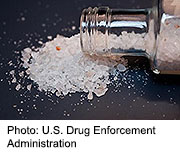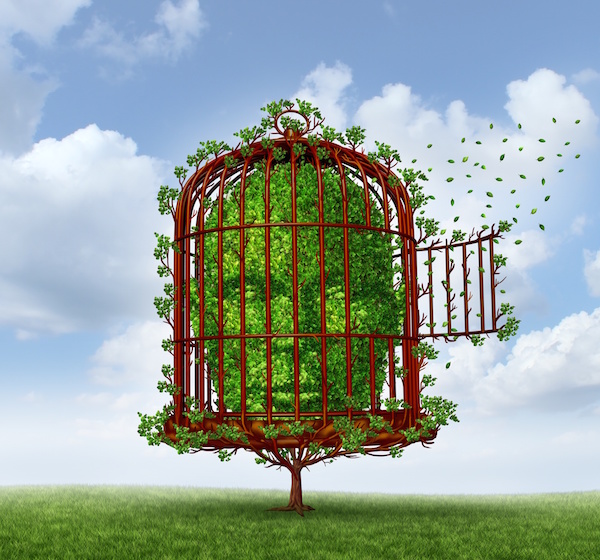
THURSDAY, April 16, 2015 (HealthDay News) — A potent new designer drug called “flakka” is making headlines across the United States, driving many users into fits of screaming, naked rage accompanied by vivid hallucinations.
Why naked? Because the drug sends body temperatures skyrocketing to as high as 106 degrees, which prompts users who have taken too much to rip away their clothes during sweating, delusional fits.
“They strip off their clothes and run outdoors, acting very violent with adrenaline-surged strength,” said Jim Hall, an epidemiologist at the Center for Applied Research on Substance Use and Health Disparities at Nova Southeastern University in Broward County, Fla.
“It can take four or more cops to hold them down,” he said.
Flakka is a chemical-cousin of the “bath salts” drugs. Both are synthetic versions of naturally occurring amphetamine-like drugs called cathinones, said Dr. Robert Glatter, an emergency physician at Lenox Hill Hospital in New York City, who has written about the new drug.
The khat plant found in the Middle East and Somalia is the source of natural cathinones. People in those areas chew the leaves of the plant to achieve a mild euphoria, Glatter said.
Flakka, also known as “gravel” in other parts of the country, takes the form of a white or pink crystal that is foul-smelling, Hall said.
The drug’s active ingredient, alpha-PVP, was banned and labeled a Schedule 1 drug by the U.S. Drug Enforcement Agency (DEA) in early 2014, Glatter said. Schedule 1 drugs are considered the most dangerous, and are believed to have a high risk for abuse or dependence, according to the DEA. Despite this, flakka’s availability has been surging on the streets of Florida.
“In all of 2014, Broward County saw about 200 crime lab cases of alpha-PVP,” Hall said, referring to samples of the drug sent to the lab for analysis. “In the first three months of 2015, we’ve seen over 300 cases.”
Police arrested a Fort Lauderdale man high on flakka earlier this month after he allegedly ran down a major thoroughfare wearing only sneakers, according to previously published reports. The man, 35, told officers he was being pursued by people who had stolen his clothes, and was trying to get hit by a car so they would stop chasing him.
In a separate incident in early April, Fort Lauderdale officers arrested a man trying to kick in the door at police headquarters, exhibiting nearly superhuman strength, according to another published report. This man believed several cars were chasing him and ran to the police department for help. When he couldn’t break the door down, he began attacking the building’s hurricane-resistant glass with big rocks.
Flakka is a potent stimulant at low doses, but can cause bizarre behavior if a user takes too much, Hall said.
The problem is that a single dose of flakka is about a tenth of a gram and costs just $4 to $5, he said. People who take more than that tiny amount — either accidentally or purposefully — risk powerful side effects that include accelerated heart rate, anxiety, paranoia, agitation and psychosis.
They also might experience one of the drug’s most severe side effects, a state known as “excited delirium,” featuring violent behavior and hallucinations often accompanied by seriously elevated body temperature, Glatter said.
It’s during these fits of excited delirium that flakka users will shed clothing as they rampage, Hall said. Internally, their muscle tissue begins to break down, releasing muscle fiber into the bloodstream and causing the kidneys to fail. They also face an increased risk of stroke or heart attack, due to their surging heart rate.
“It’s a very dangerous drug because it has so many side effects, and it doesn’t require a long-term history of frequent abuse of this drug to get these symptoms,” Glatter said.
Broward County currently is seeing as many as 20 excited delirium cases per day in local emergency rooms due to flakka and similar drugs, Hall said. Within the past six months, at least 10 deaths have been linked to flakka abuse, he added.
The drug works by blocking the body’s ability to reabsorb the brain chemicals dopamine and norepinephrine, Glatter said. Dopamine is the “feel good” hormone that has been linked to other drugs, while norepinephrine is a form of adrenaline.
“Flakka allows these chemicals to remain in the synapses longer, producing an altered state of consciousness,” he said.
Officials are particularly concerned about flakka because it can be used many different ways, including swallowing, snorting or injecting, Glatter said.
It also can be dissolved into liquid and inhaled as e-cigarette vapor. “You can be in public, inhaling this drug through an electronic cigarette, and no one’s the wiser,” Glatter said.
The U.S. National Institute on Drug Abuse has warned that smoking flakka can send the drug very quickly into the bloodstream, making it particularly easy to overdose.
More information
For more on flakka, visit the U.S. National Institute on Drug Abuse.
Copyright © 2026 HealthDay. All rights reserved.

